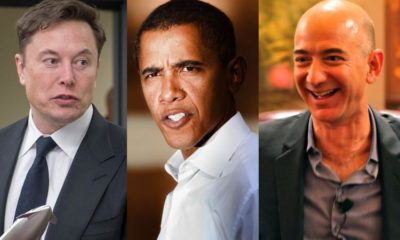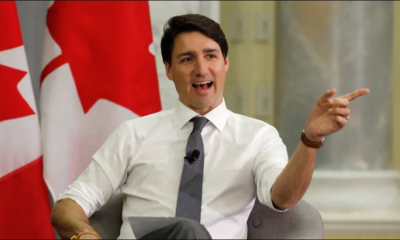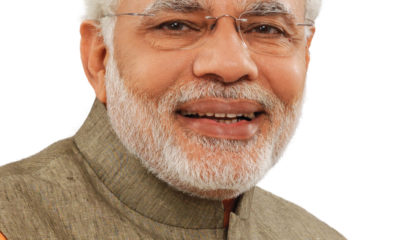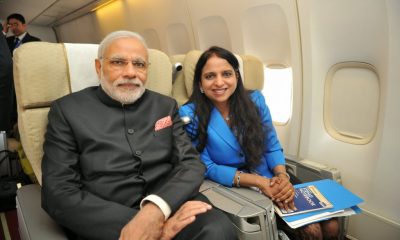World
Obama urges citizens not to ‘succumb to fear’
 New York : US President Barack Obama urged citizens not to “succumb to fear” after the attacks over the past few days in New York, New Jersey and Minnesota, presumably perpetrated by jihadis.
New York : US President Barack Obama urged citizens not to “succumb to fear” after the attacks over the past few days in New York, New Jersey and Minnesota, presumably perpetrated by jihadis.
Obama made a brief statement to the press on Monday night from a hotel in New York where he is attending the 71st session of the UN General Assembly, EFE news reported.
“At moments like this, I think it’s important to remember what terrorists and violent extremists are trying to do. They are trying to hurt innocent people, but they also want to inspire fear in all of us,” Obama said.
“We all have a role to play as citizens in making sure that we don’t succumb to that fear,” he said.
The President noted that “neither individuals nor organisations like IS (Islamic State) can ultimately undermine our way of life,” and this is exactly the “kind of strength that is going to be absolutely critical not just in the days to come but in the years to come.”
“By showing those who want to do us harm that they will never beat us” will be “the most important ingredient in us defeating those who would carry our terrorist acts against us,” he said.
While Obama was speaking, US authorities confirmed the detention of the suspect sought by police and the Federal Bureau of Investigation (FBI) for possibly detonating several explosive devices in New York and New Jersey.
He was identified as Ahmad Khan Rahami, 28, an immigrant from Afghanistan with a US passport, who was captured by police after a shootout in the city of Linden, New Jersey.
New York police believed that Rahami is the man who appears in videos taken by security cameras on 23rd Street in the Chelsea neighbourhood of Lower Manhattan, where on Saturday a bomb exploded that injured almost 30 people on 27th Street, and where another device was found that did not detonate.
New Jersey authorities also believe that he might be linked to the bomb explosion early Saturday in the town of Seaside Park, New Jersey.
According to Obama, up to now the authorities have found no connection between what happened in New York and New Jersey and the attack at a shopping mall in Minnesota, perpetrated Saturday by a suspected jihad sympathiser who stabbed nine people.
The president said the FBI is investigating the incident in Minnesota as a “potential act of terrorism”.
Though Obama did not speak of the three attacks over the past few days as being connected to international terrorism, he did say that the US would continue to lead the global coalition against the IS, the group that is “instigating a lot of people over the internet to carry out attacks”.
World
Lockdowns in China Force Urban Communities to Defy Censorship and Vent Frustration Online

Shanghai’s rich middle class is leading a wave of online dissent over the strict and prolonged lockdowns imposed in various parts of the country. Chinese internet censorship is struggling as patience is wearing thin in many urban centers, coming up with creative forms of online protests.
Social Media Posts Revealing Lockdown Tension in Shanghai
Drawn-out lockdowns are nothing new in China as authorities insist with the nation’s zero-Covid policy since the start of the pandemic. Currently over This time around, however, metropolitan areas like Shanghai are increasingly difficult to keep quiet, given that its more than 25 million residents have seen weeks of total isolation along with food shortages and many other service interruptions.
Dozens of towns and reportedly over 300 million Chinese citizens have been affected by lockdowns of different severity. As expected, urban netizens have been most outspoken over their difficulties by finding creative ways to get around state censorship and bans placed on topics, news comments and spontaneous campaigns.
Shanghai residents have been using mobile proxies and hijacking seemingly unrelated hashtags to talk about healthcare issues, delivery failures and the overall severity of their situation. The “positive energy” that the Chinese government wants to transmit during the recent prolonged series of lockdowns does not come naturally to those counting food supplies and online censors are working hard to filter words, trending topics and undesired social media sharing.
WeChat groups and message threads are under constant monitoring. Posts questioning the zero-Covid approach have been quickly deleted, including by leading Chinese health experts like Dr. Zhong Nanshan. Video footage is soon censored and protests and investigations are quickly made to disappear.
Where this has not worked, officials have exposed banners with warnings and outright threats like “watch your own mouth or face punishment”, while drones have been patrolling the city skies. Yet, if anything, this has led to further tensions and unspoken confrontation with Shanghai’s educated and affluent middle class.
Creative Online Solutions Harnessing Civic Energy
Announcements by Chinese social media that they would be publishing the IP addresses of users who “spread rumors” have not helped either. Tech industry research has shown that much of Asia’s tech-savvy population has a habit of using mobile proxies and other privacy tools, quickly finding workarounds to browse the internet freely and talk to the world about the hottest topics.
The sheer volume of forbidden posts is already a challenge for the very censorship system, experts explain. Unable to track all trending hashtags, state workers overlook topics that speak about the US, Ukraine or other popular news. Linking human rights elsewhere to their situation, Chinese online dissidents establish their informal channels and “hijack” the conversation to share personal or publicly relevant information about the Covid suppression in their town.
Sarcastic and satirical posts still dominate. Others hope to evade the censors by replacing words from famous poems or the national anthem. One thing is certain – social media, when harnessed with the right creativity, has proven its ability to mount pressure on the government in even some of the most strictly controlled tech environments like China.























